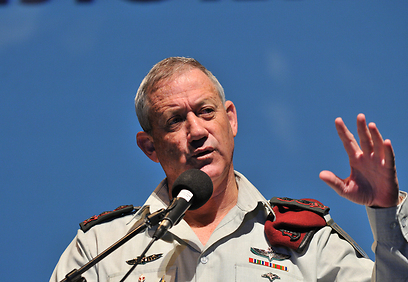
Gantz discusses army overhaul, budget cuts
IDF chief admits he's 'not happy' about plan to dramatically downsize forces but adds army must move forward and adjust to new reality. 'We'll see the rewards in two to four years'
IDF Chief of Staff Benny Gantz commented for the first time on the army's plan for large-scale cuts that will see many units closed or downsized and 3,000-5,000 career officer positions cut.
"In my 12 years in the General Staff, I've never seen such changes. We have to make sure we don't fall in the next two years," Gantz said.
Related stories:
- IDF cuts bode uncertain future for career soldiers
- IDF to cut down on Air Force squadrons, armored units
- Gunfire erupts near Israel-Egypt border
Speaking at a conference of the Manufacturers Association in Tel Aviv, the IDF chief said that while the cuts will save the state some NIS 7 billion, the army will still be in a deficit of NIS 20 billion in the next five years.
"I'm not happy about the cuts. The next couple of years will be hard but we'll survive them with the help of smart planning. If you make a mistake – you can't fix it, but we have to be bold and move forward."
Gantz stressed that the IDF must reinvent itself and adjust to the new reality but claimed that "the nature of warfare has not changed. We'll see more fire, more hidden enemies on the borders, and fewer divisions but we'll know how to face them. We'll see the rewards in two to four years. Our forces might be diminished but will be stronger and better equipped."

Gantz at Manufacturers Association conference (Photo: Yaron Brener)
According to Gantz, some 250 researchers in army colleges are currently studying the financial and economic aspects of the plan. "We don't have endless flexibility. We need to remember war is not tailor-made."
Giving a survey of the situation on Israel's borders, Gantz stressed the threat of instability in neighboring countries but noted recent developments could present opportunities for Israel.
"Every day could end differently than how it started. We're experiencing ongoing regional turmoil which has consequences for our security," he said.
"We don't know what will happen in Egypt in two weeks and terrorists continue to emerge in Sinai. At the same time there are opportunities: Such countries as Turkey, Jordan and Lebanon – no great fans of Zionism – have an interest in removing Syria from the axis of rogue states. Saudi Arabia, Jordan and Egypt have an interest in boosting security in Sinai."
The army chief also addressed recent attacks against haredi soldiers: "It's insane and unacceptable that this is how soldiers go home. There is no place for bullying in our society and we must do everything to end this."
- Receive Ynetnews updates directly to your desktop










